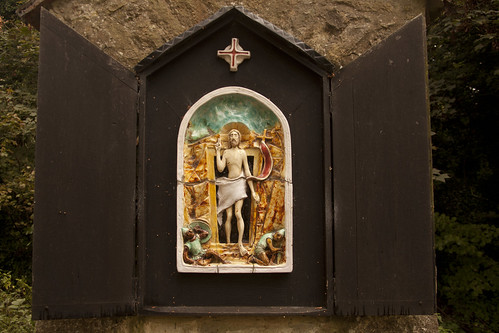 |
| Part of the Rosary Walk at Aylesford Priory |
We need here to revisit the difficulties mentioned in this column on Easter Day - namely the emphasis placed by Luke (and also by John) on graphic physical details manifested by the Risen Christ - inviting Thomas to place his hands in his side, telling the disciples that he was not a ghost because ghosts didn't eat, as he did. There is almost a suggest of re-animation, rather than Glorification in Luke's Gospel, and indeed in John's. This clashes with St Paul's assertion that "Flesh and Blood cannot inhereit the Kingdom of God" (1 Cor, 15:44, 50), and with his dismissal as "stupid questions" of concerns expressed to him about what kind of body people will have "when they come back". Paul is adamant. There is nothing physical about the risen body - either for Christ or for us. He tells us that what is sown and goes intot he grave, is a physical body (psychikon), but what is raised is a spiritual body (pneumatikon).
We've heard it all before from Loftus, though he goes further than before in explicitly rejecting as worthless two of the four Gospels. The two, that is, which have anything of detail to say about the nature of the Resurrected Christ.
It is a pity that Loftus doesn't extend his admiration for St Paul to St Paul's teaching on sexual morality. As soon as St Paul says anything about that, Loftus is the first to dismiss him as an irrelevant dinosaur.
As for St Paul contradicting the Gospel account of the Risen Lord, the clue is in the term 'spiritual body'. St Paul preached the resurrection of the Body: a teaching which went down very badly with educated Greeks, who were perfectly comfortable with the idea of the immortality of the soul.
Acts 17:32 Now when they heard of the resurrection of the dead, some mocked; but others said, “We will hear you again about this.”
Yet St Paul persisted, because it is the truth: while the nature of the resurected body defies exact description, it is not a merely spiritual existence we can look forward to, and which is enjoyed by Christ. The survival of the soul after the death of the body is one thing; the resurrection, of Christ on Easter Sunday and of us on the Day of Judgement, is something else, something which adds something to our existence after death.
What, Basil, do you imagine that it adds?
There's a petition going about old Loftus; go and have a look here.
Support the work of the LMS by becoming an 'Anniversary Supporter'.
Translating "psychikon" as "physical" and contrasting it with "pneumatikon" with a anti-physical connotation is very dodgy in any case: both psyche and pneuma have a physical aspect to them in the medicine of St Paul's time
ReplyDeleteFor Galen the pneuma is transformed into the psychic (neurological?) spirit or force when the pneuma enters the brain. St Paul might well be referring to Greek medical theory, in which case he means that in the resurrected body the pneuma is not transformed by the body into its own energy and form, but rather that Christ's pneuma or spirit transforms our body into its form. But this pneuma is not simply a-physical in our sense of the word "spiritual", nor would the Hebrew equivalent for pneuma have carried any such notion.